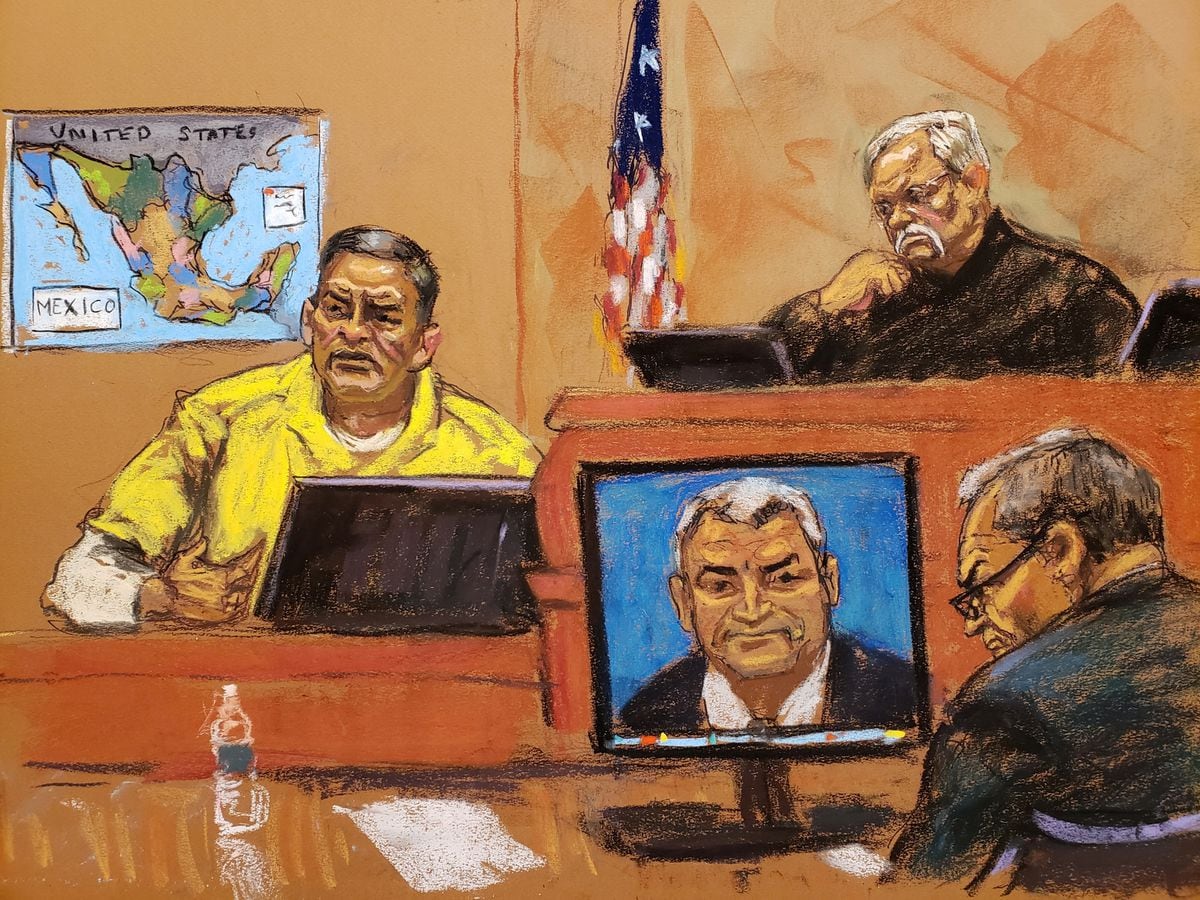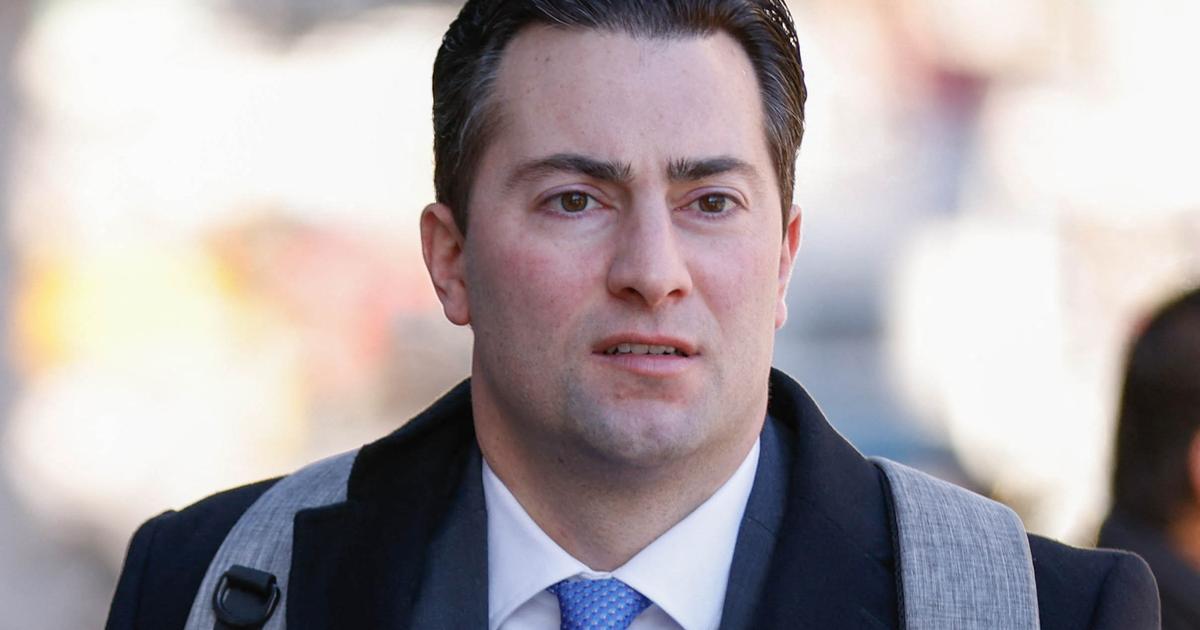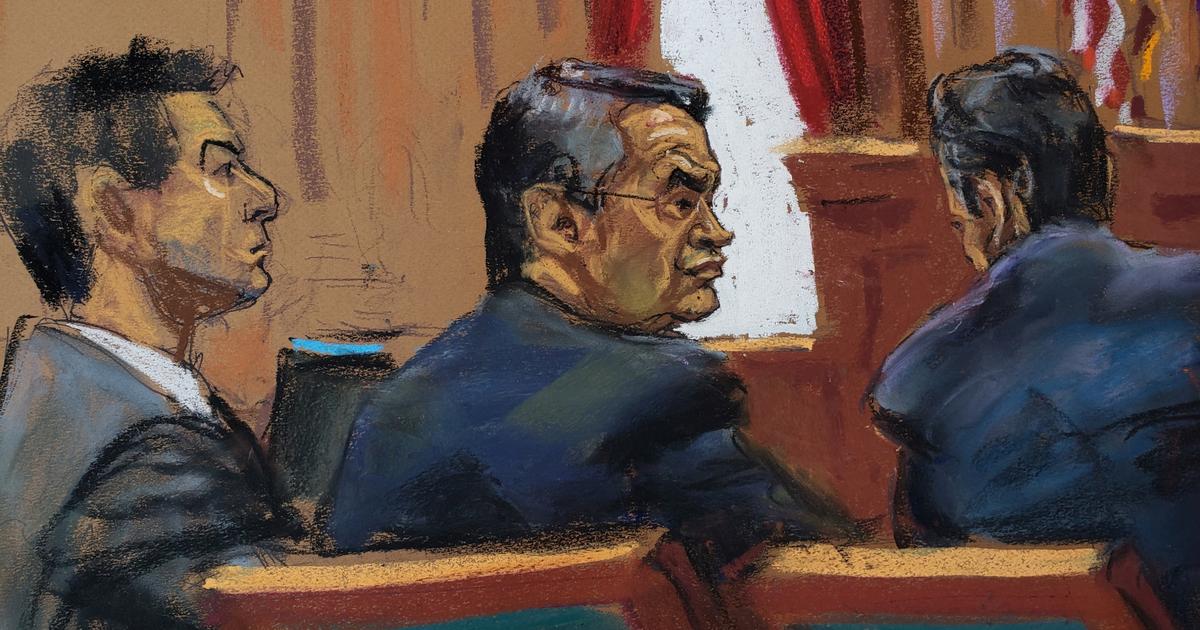The lights in the Courthouse for the Eastern District of New York were turned off at the request of prosecutors.
Harold Poveda, aka
The Rabbit
, was surrounded by dozens of people: the judge, the jury, the lawyers and the journalists.
But at that moment he was left alone.
“Can you explain to us what we are seeing, please?” they asked when the images began to be projected.
"Yes, of course," said the capo with a thick Colombian accent.
"It is my home".
The drug trafficker began to describe "the fantasy mansion," a small palace south of Mexico City that took him four or five years to build.
It cost him almost seven million dollars.
The camera focused on a hand-carved door that he brought from India, an imitation of medieval armor, suspension bridges that cut through extensive gardens, and a swimming pool that connected to his personal nightclub.
What nobody expected was such a detailed account of The Rabbit about his animals.
Only in that residence did he have lions,
other big cats, a chimpanzee, exotic birds and a “spectacular” white Persian cat “like cocaine”.
Suddenly, Poveda began to cry.
He recalled with a cracking voice the kingdom he built in the midst of an all-out cartel war 15 years ago and the betrayals that ultimately led to him losing everything.
Shortly before he had been proud because that night they did not catch him.
He managed to scale the cage of the white tigers and was able to escape.
Almost everything that was known about "the fantasy mansion" was from journalistic work.
In fact, it was the media that recorded the video that was presented in court and that came up with that name.
This time, however, it was The Rabbit who relived everything, as if it were an autobiographical story.
Poveda, a former member of the Sinaloa Cartel, was called to testify this week in the trial against Genaro García Luna, who was the head of Mexico's security during the government of Felipe Calderón (2006-2012), a period in which that the former president launched what became known as the drug war, which still has its consequences.
García Luna, once a police model,
He faces charges for drug trafficking and organized crime in the United States after his arrest in Dallas in December 2019. The testimonies of El Conejo and other drug lords who have become cooperators with the authorities have extravagant passages and sometimes, frankly, incredible.
But they have not been candid or colorful.
are also a
mea culpa
:
I killed, I kidnapped
and
I tortured
.
It is no longer about television series or fictional stories.
Two decades after sowing terror, it is now the drug traffickers who tell everything.
The most relevant trial for Mexico since the fall of Joaquín
El Chapo
Guzmán -sentenced in the same court and by the same judge handling this case- has become the backdrop for the largest exercise in collective memory about the war against drug trafficking, which has left hundreds of deaths in the country.
El Conejo talked about how he had his wife's lover, a Colombian police officer, killed.
He detailed how his bosses thought to do the same with García Luna, who at that time was in charge of Security in the country, and "send his head to the Government so that everyone could see that they were not playing with them."
He confessed that he had made between 300 and 400 million dollars during his criminal career.
And he said that he pleaded guilty in the United States to trafficking more than a million kilos of cocaine.
His record predicted that he would spend the rest of his life behind bars, but since 2019 he has been on probation.
“You said that you were responsible for the death of at least 100 people, correct?” Florian Miedel, one of the defense lawyers, asked Óscar Nava Valencia.
El Lobo
, as the capo is also known, who was silent for a few moments.
"I had to make bad decisions in my life, yes," the witness snapped.
"Is that what you call making bad decisions?" Miedel shot back.
Confronted about his legacy of violence, Nava Valencia maintained that if he was there it was to tell the truth, no matter how crude it was and no matter how uncomfortable that situation made him.
"It's not easy for one to sit here and say things like they are," the drug trafficker admitted.
“Did you torture?” Assistant District Attorney Erin Reid asked Israel Ávila, another former member of the Sinaloa Cartel.
"Several times," she replied.
"More than 10 times?" Reid questioned.
“Probably,” Avila said after another long pause.
He was trying to remember.
The drug trafficker, a middle manager of the organization, explained that he was a victim and also a perpetrator.
“They tortured me because they believed that I was working with the United States government,” he said.
The test of loyalty left him with cut marks on his face, burns all over his body, and broken bones from the beatings and bindings.
But he had to stay.
"I had to keep working for them because if I didn't they were going to kill me."
Before the prosecutor could ask another question, she managed to say: "Not only to me, but to my family as well."
El Conejo also assured that he was tortured, but not at the hands of his rivals, but by the Police in charge of García Luna.
“They blindfolded me,” he recounted.
He was beaten before being presented to authorities and pressured by agents who ransacked two of his properties and forced him to record a false confession, he said.
“They put a plastic bag on me to suffocate me,” he continued.
"They undressed me."
"They gave me electric shocks."
"Until I couldn't take it anymore," he settled.
One day after the kidnapping, he was presented to the media as a war trophy.
In the testimonies of the trial, the line that divides the authorities from organized crime has been, at times, very narrow.
That is what is at stake.
García Luna is accused of having ties to drug trafficking for more than 20 years.
Sergio Villarreal Barragán, the first witness called by the Prosecutor's Office, told how he disguised himself as a policeman and practically coordinated the capture of Jesús
El Rey
Zambada, his former partner in the Sinaloa Cartel, in 2008. The drug trafficker was so infiltrated in the security forces that they had uniforms, patrols and identifications equal to those of the law enforcement, always according to his testimony.
He said that they received sensitive information, that there were equal distributions of the seized drugs, that they removed and placed commanders in exchange for multimillion-dollar bribes.
On one occasion, he assured, so much money was delivered that it did not fit in the car where they were taking him "The cartel grew with the help of the Government," said El Grande, as the highest-ranking drug trafficker who has spoken about the case is also known, who He was arrested in 2010 and extradited in 2012, during Calderón's six-year term and, after serving his sentence, he was released more than a year ago.
It was not only Villarreal Barragán.
El Lobo
Valencia said that he paid three million dollars to meet with the then Secretary of Security for 15 minutes in a car wash in Guadalajara, the cover of one of his partners.
Ávila said that it was the agents themselves who helped them unload the drug shipments that landed at the Mexico City International Airport and other terminals in the country.
He even commented that they helped them hide and that they laughed out loud when they heard on the radio frequencies when other policemen said that they were after them.
Poveda presumed that he was able to return to Colombia without going through immigration and that the police escorted him to the plane door so that there would be no problems.
“It was a beauty,” said El Conejo.
It has not only been the bosses who have told their truth.
Raúl Arellano, a former Mexican police officer, reported that he received "strange orders" to give free rein to drug trafficking at the airport in the Mexican capital.
There was a whole police code to seal the pact of impunity in the transfer of cocaine, weapons and money.
"They were talking about the fact that they had passed 'the suitcase' of the 79 [key for drugs] and the 40 [money]," Arellano settled.
Francisco Cañedo, another former agent, affirmed that he saw his boss meeting with Arturo Beltrán Leyva and Édgar Valdez Villarreal
La Barbie
, two of the most feared drug traffickers of their time.
“I was left trembling,” he said of the meeting supposedly carried out by the head of his corporation.
After denouncing, Cañedo ended up charged with six serious crimes, but was later exonerated.
Disappointed and jaded, Arellano resigned.
García Luna, in the voice of his lawyers, has said that the testimonies border on the fantastic.
“There is no evidence of the money, no photos, no emails, no text messages,” said César de Castro, the defense leader.
"Everything is based on the testimonies of murderers, kidnappers and traffickers," he added.
For some media and sectors of the population, the testimonies are hard to believe.
They have a hard time imagining a Cabinet member meeting on a weekday with several crime bosses and receiving suitcases of more than a million dollars in dirty money, subject to his orders.
Others believe that the defendant is practically sentenced, despite the fact that there is almost a month and a half left before the end of the trial.
The fate of the accused will be decided more than 3,000 kilometers from the border.
Many years later, and as if they were remembering past lives, drug traffickers enter and leave the confessional at each hearing.
Sometimes they are defiant and other times they seem cornered or remorseful.
They speak of unimaginable volumes of money;
submarines and boats full of "merchandise";
luxury cars and fine jewelry;
ridiculous nicknames, and corruption in all levels of government.
The Prosecutor's Office will be challenged to connect the dots and support the accounts beyond a "reasonable doubt."
The trial is scheduled to resume next Monday.
subscribe here
to the EL PAÍS México
newsletter
and receive all the key information on current affairs in this country















